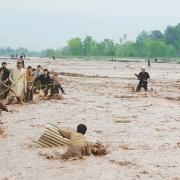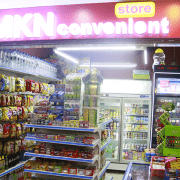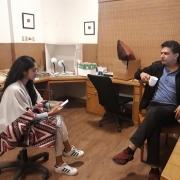Awareness Week With GarbageCAN
When it comes to the environment and sustainability, awareness is key – this means acquiring the knowledge of a situation or fact. Awareness can come through education, but in a country like Pakistan that has the lowest literacy rates in the world, many people (especially women) don’t have access to it. But, it can also mean learning from real-life experiences that we may encounter, like finding pieces of plastic floating in the sea and wondering how it got there; or coming across an important piece of news online, like the great Amazon fire. The latter is quite common as we find ourselves hearing about current events on social media rather than traditional means. This makes it possible to reach people in an easy and efficient manner, but what about the population that isn’t online – like kids, or the underprivileged youth? For them, engaging them personally through talks, workshops, activities is a more effective and impactful method. From Friday 13th to Thursday 19th December, GarbageCAN had a series of events that aimed at increasing environmental awareness amongst people of various ages and backgrounds – from children to corporations.

Everything starts from day one as toddlers; our language, our habits and our level of knowledge – some behaviours are learnt naturally, while others are learned through observing and imitating our parents actions. That’s why, this past weekend we were at the Buzzing Beez Playcafe to discuss the 3R’s – reduce, reuse and recycle, with kids aged 4 to 6. We provided them with common trash items such as plastic bottles, scraps of paper, aluminium cans etc. for them to sort and throw into the correct recycling bins. Through this activity, they were able to learn about landfills, where most of our rubbish ends up, and ways we can keep our city clean.

We also visited a school in Ghaghar Pathak, built and run by The Citizens Foundation (TCF) and supported by ENGRO Polymer and Chemicals. TCF is a leading non-profit organisation that provides education for underprivileged children in rural parts of the country where literacy rates are at its lowest. To date, TCF has built over 1,500 schools and educated 250,000 kids in Pakistan. Here, we had the opportunity to talk to 30 students between the ages 7 to 11 about the importance of taking care of our environment by practicing the 6R’s: reflect, reduce, reuse, recycle and rot. This was followed by a clean-up of the streets around their school that were lined with trash, which not only engaged the students and teachers, but also locals in the neighbourhood that questioned the purpose of the activity.

This event was sponsored by ENGRO Polymers and Chemicals. ENGRO is a Pakistani multinational conglomerate that produces fertilizers, energy, polymers, chemicals and food. As part of their CSR program, several employees had also joined us at the school and participated in the clean-up. Although community service of this kind generally benefits corporations from a public relations perspective, it also gives the working class population a chance to take a step back from their day to day operations and become aware of other significant issues, enabling them to reflect and eventually make more mindful decisions.
Last but not least, we put our words into action by providing our comprehensive waste management services at the WOW (Women Of The World) Festival. Here, we had set up recycling bins around the venue to ensure zero littering and the right disposal of waste, but found that people didn’t pay much attention to whether the bins were solely for plastics or something else as it was mixed with styrofoam cups, papers and more. However, the festival is a great initiative that aims to empower women from around the world through performances, talks, workshops and showcasing skilled artistry that linked to mindful consumerism. For example, NowPDP’s booth displayed eco tote bags made of organic fabrics that were hand-stitched and block-printed by individuals with disabilities. While RLCC’s booth had a range of artisanal handicrafts that were all upcycled from newspapers, textile waste, date leaves and more. By buying these one-of-a-kind products instead of shopping from mainstream brands that contribute to our waste problem, we’re not only supporting local communities, but are also making sustainable lifestyle choices.
To conclude, it doesn’t matter how old you are or where you come from, it’s never too late to learn and change bad habits that we know are harmful to our planet. One-off events and activities may bring awareness and provide temporary solutions; but in order to achieve long-term change, we need to practice the 6R’s on a daily basis, encourage & support each other and collectively work together to ensure that we’re not leaving behind trails of trash that will last for generations to come.





Leave a Reply
Want to join the discussion?Feel free to contribute!